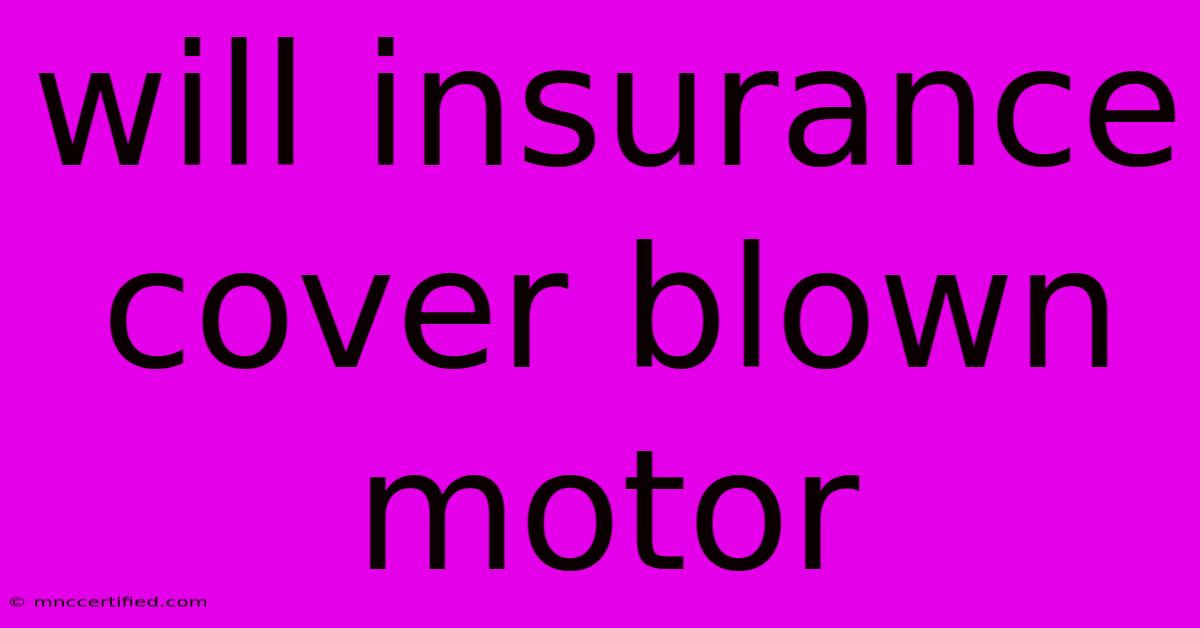Will Insurance Cover Blown Motor

Table of Contents
Will Insurance Cover a Blown Motor? A Comprehensive Guide
A blown motor is a catastrophic car problem, leaving you stranded and facing a hefty repair bill. The immediate question on many minds is: will my car insurance cover this expensive repair? The short answer is: maybe. It depends on several factors, and understanding these is crucial. This guide will delve into the intricacies of insurance coverage for engine failure, helping you navigate this stressful situation.
Understanding Your Car Insurance Policy
Before we explore the specifics of engine failure, let's clarify the different types of car insurance coverage and how they relate to mechanical breakdowns:
-
Liability Coverage: This covers damages you cause to others' property or injuries you inflict on others in an accident. It does not cover damage to your own vehicle, including a blown engine.
-
Collision Coverage: This covers damage to your vehicle resulting from a collision with another vehicle or object, like a tree or a wall. A blown engine due to mechanical failure is typically NOT covered under collision. However, if the engine failure was caused by a collision (e.g., the engine block cracked in an accident), then collision coverage might apply.
-
Comprehensive Coverage: This is broader and covers damage to your car from events other than collisions or accidents. This includes things like theft, vandalism, fire, and sometimes, acts of God. Whether comprehensive coverage includes a blown engine depends on the specific policy wording and the cause of the failure.
-
Roadside Assistance: This add-on coverage provides help with things like jump starts, flat tires, and lockouts. It generally doesn't cover engine repair.
What Causes a Blown Motor and How it Affects Insurance Coverage
The cause of the engine failure is paramount in determining insurance coverage. Here are some common causes and how they relate to insurance:
Mechanical Failure (Wear and Tear):
This is the most common reason for engine failure. It encompasses issues like:
- Lack of maintenance: Neglecting oil changes, ignoring warning lights, and failing to address minor issues can lead to major engine problems.
- Wear and tear: Over time, engine parts simply wear out.
- Manufacturing defects: Although rare, faulty parts from the manufacturer can cause premature engine failure.
Insurance typically does not cover mechanical failures due to wear and tear or lack of maintenance. These are considered the responsibility of the car owner.
Sudden and Unexpected Events:
In certain situations, engine failure might be covered under comprehensive coverage:
- Sudden and catastrophic event: A sudden, unexpected event like a rod knocking (a connecting rod breaking and damaging the engine) might be covered, depending on your policy. The key here is the element of suddenness and unpredictability.
- Acts of God: If a natural disaster (flood, hailstorm) directly caused the engine to fail, comprehensive coverage might apply.
Accident-Related Engine Damage:
If a collision or accident directly resulted in engine damage, collision coverage might apply. For example:
- Direct impact: A car accident causing direct damage to the engine block.
- Secondary damage: If a collision causes a fire that damages the engine.
How to Maximize Your Chances of Coverage
To improve your odds of getting insurance coverage for a blown motor, you should:
- Read your policy carefully: Understand what your policy covers and excludes. Look for specific wording related to engine failure or mechanical breakdowns.
- Maintain meticulous records: Keep records of all maintenance performed on your vehicle. This can help demonstrate that the failure wasn't due to neglect.
- Report the incident promptly: Contact your insurance company immediately after the engine failure.
- Obtain a professional diagnosis: Have a qualified mechanic assess the damage and provide a detailed report. This report will help support your claim.
- Consider supplemental warranties: Extended warranties or service contracts can often cover major mechanical failures, including engine problems.
Conclusion: Navigating the complexities of insurance claims requires proactive steps. Understanding your policy, documenting maintenance, and seeking professional advice are key to successfully navigating a blown engine claim. Remember, the specific details of your policy and the cause of the failure are critical factors determining coverage. Always consult with your insurance provider for clarification and guidance.

Thank you for visiting our website wich cover about Will Insurance Cover Blown Motor. We hope the information provided has been useful to you. Feel free to contact us if you have any questions or need further assistance. See you next time and dont miss to bookmark.
Featured Posts
-
Cotswolds Ellen De Generes New Home
Nov 22, 2024
-
Landlord House Insurance Ireland
Nov 22, 2024
-
Dealing With Fred Loya Insurance
Nov 22, 2024
-
Us Embassy Suspicious Package Found
Nov 22, 2024
-
Reverend Richard Coles Age Husband Music
Nov 22, 2024